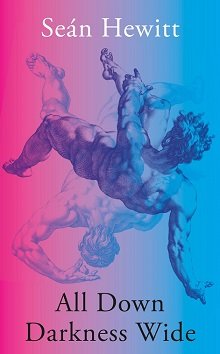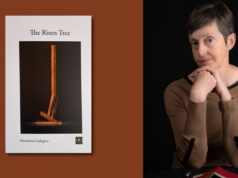
All Down Darkness Wide|Seán Hewitt|Jonathan Cape|9781787333383|€18.50
The title of Seán Hewitt’s newest book, All Down Darkness Wide, comes from the Gerard Manly Hopkins poem ‘The Lantern out of Doors’.
In the poem, Hopkins imagines men going by him; they are the ‘lantern’ in the dark ‘that interests our eyes’ until they disappear through ‘death or distance’. It is a brief, almost spectral poem, metaphorically rich yet elliptical in meaning.
Hewitt, who is a superb reader of Hopkins, is struck by the central image in the poem, which he describes as a procession of ‘men walking in the darkness, glowing like lanterns in the gloom of the world’ whose ‘lights were being put out’. It is, significantly, the poem that Hewitt recalls on the day he learns via an internet search that a former boyfriend from university has died.
This unexpected, accidental revelation spurs Hewitt to ‘skirt the darkness’ of his own life and loves, out of which he has constructed this exquisite, heartbreaking memoir.
Hopkins
Hopkins, we learn, was the subject of Hewitt’s PhD dissertation at university. But as becomes clear, Hewitt feels a much stronger affinity to the poet than merely as an object of academic study.
As a gay man in the Jesuit order in the middle of the nineteenth century, Hopkins had to carefully conceal, and repress, his sexuality.
Remarkably, his journals detail the inner, self-flagellating torment he felt about his attraction to other men, with which Hewitt draws parallels to the terrible shame he was made to feel about his own sexuality growing up in the north of England in the late 1980s and 1990s.
Brokenness
This was a time, Hewitt observes, when the AIDS crisis was still raging and when social attitudes were not as nearly progressive or tolerant as they subsequently became. Yet the commonality of Hewitt’s experience with that of gay men in Hopkin’s own Victorian world represents something continuous, ‘something unchanging’:
“It felt dangerous to admit it, as though this commonality was a sort of curse, a brokenness in them, in us, but I knew the brokenness was in the world instead.”
All Down Darkness Wide captures that brokenness with extraordinary, insightful precision.
Hewitt’s acute loneliness and, at times, utter lostness, is palpable and intense. These feelings are delineated in his many reflections on his own shyness and his reflexive habit of not wishing to draw attention to himself.
But there is also tremendous joy too: at the centre of the book is Hewitt’s deep relationship with Elias, a young Swedish man he met while backpacking around South America and with whom he fell deeply in love.
Elias
The book charts the relationship between the two men from their first meeting in Colombia through to its gradual breakdown in Sweden. In its first flush it is flirty, hesitant, electric.
Elias, unlike Hewitt, is sociable and at the heart of everything; Hewitt for his part is reserved, awkward, unsure of himself. He is self-conscious, deeply self-aware, uncertain of how to behave.
But before long, Hewitt finds himself moving to Gothenburg to work on his PhD and to start a new life with Elias. In the airport he wonders ‘how to translate my feelings for Elias in such a public place’ but soon is relieved to discover that Elias’ ebullient nature is the same at home as it was in South America.
But summer warmth turns to autumn cold and routines become settled; the energy changes and before long Elias’ mental health gradually begins to spiral downwards. ‘Everyone I love will leave me’, Elias says, a portentous statement to which there can be no truly satisfying response.
Gifted stylist
The depth of Hewitt’s feelings for Elias make this heart-rending reading. But it is Hewitt’s ability with language which elevates this memoir above the ordinary. Elias’ deepening depression and the exhausting, guilt-making effects it has on Hewitt is depicted with enormous skill.
Already an accomplished poet, Hewitt is also a gifted prose stylist, one who achieves a rare balance of delicacy and power. He knows the muscle and beauty of image and symbol, which are artfully woven throughout the book, enriching and deepening the themes.
Here, as he and Elias begin to drift apart, he subtly picks up Hopkins’ image of the light-bearer in the dark, which he transforms into a romantic description of wandering lonely in a forest:
“I remember walking out of the house each night after dinner, taking the tracks over the hillsides and through the woods, with the lamplight glowing orange through the fog and each branch hung with jewels of half-frozen dew. The air was cold and beaded, and the place seemed empty, only me walking in my heavy coat and the shattered water lilting between the trees.“
Turmoil
From this point on, we will dread these men joining the long procession walking in the darkness. It is principally Elias, of course, whose light will either be put out by death or distance.
The drama of the book pivots on the turmoil of Elias’s wrestling with the choice between life and death and his eventual hospitalisation, but Hewitt’s sense of impotence and his growing frustration at being unable to rescue Elias is also deeply moving.
There are moments where the light seems to break through. A mundane trip to a furniture store forces Elias to temporarily invest in some vague, shared future. On the same trip, Hewitt comes across a book of poems by the Swedish writer Karin Boye.
He and Elias begin to translate her work into English, which provides them with a mutual project. Yet, it is also through Boye’s bleak poetry that Hewitt is essentially confronted by the limitations of both his Swedish and Elias’s English, and this inability to find the most evocative translation becomes a metaphor for the eventual breakdown of the relationship.
Boye’s life, too, is threaded into the tapestry of meanings in the book: as a lesbian who died by suicide, her personal story echoes the larger themes of All Down Darkness Wide.
Truthfulness
In his classic work Sincerity and Authenticity, the American critic Lionel Trilling posited that autobiography – of which memoir is a close cousin – presses towards ‘a more searching scrutiny of the inner life’ where the writer is ‘true to himself’. The reader is impressed by Hewitt’s search for such personal truthfulness in All Dark Darkness Wide.
Towards the end of the book, he recollects how he became an accomplished liar as he desperately, destructively, tried to conceal who he was in order to conform to his society’s expectations.
And so, for many years he kept up pretense of his Catholic faith. Concealment also has a literal form: Hewitt offers accounts of how other sexual encounters were carried out under the secretive cover of darkness: in lay-byes at night, in the back of the cinema and behind nightclub bins, and, in the superb, opening Gothic-inflected scene, in a graveyard.
Haunting
But this darkness is, we are given to understand, a kind of death, where the light of who one truly is is extinguished. Enfolded in the darkness are the ghosts of history. In conjuring up these ghosts, Hewitt frequently synthesizes central images of darkness, of the spectral, of solitude, of nature:
“The wild lupins that … grew in the summer were all shrunken back to the tuber, and only a wick of pink light was colling over the sea. I closed my eyes, pressed my lips to the cold air, and balanced myself against it, as though I were lowering myself slowly into a new reality. Out here in June, before a party, we had been cutting back the lupins and they seemed miraculous to me, so profuse and wild … when I opened my eyes I could almost picture the ghosts of those lupins gathered around me; luminous, shadowy, standing in their tall circle, tolling their silent bells.”
The narrative is replete with such melancholy, illuminating, haunting passages. No straightforward conclusions can be drawn from Hewitt’s memoir, but this is often the mark of a great artist.
All Down Darkness Wide is a beautiful book by a writer of outstanding talent.

Eoghan Smith is the author of The Failing Heart (Dedalus 2018). His second novel, A Provincial Death is out now with Dedalus.













